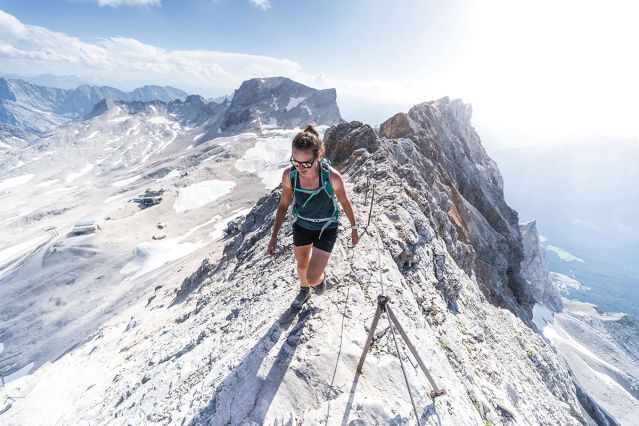On Top of the World
Adventure athlete Jenny Tough pushes her mental and physical limits to race across remote mountain ranges.
By Devon Frye published November 1, 2022 - last reviewed on November 22, 2022

Jenny Tough is all too familiar with social distancing. An endurance runner, cyclist, and adventurer, she has spent much of her life scaling mountains in the world’s most isolated regions, often completely alone. In 2021, the Canadian-born athlete completed a five-year odyssey to become the first person to run, solo and unsupported, across a mountain range on every continent save Antarctica—starting in the Tien Shan of Asia and ending in Europe’s Transylvanian Alps. In her recent book, Solo, she recounts her expeditions and the lessons she’s learned about solitude, resilience, and human connection along the way.
Why run across so many mountain ranges?
I see adventure as a creative pursuit, one where I’m constantly inventing challenges for myself. They don’t need to make sense to anyone else. In this case, I started with a goal to run across Kyrgyzstan. No one had ever done it before, and everyone told me it couldn’t be done; but I went, and I did it. And on that trip, I became the best version of myself. But finishing a project that big leaves a hole, and I felt pretty depressed afterward. So I decided to just keep going.
What does it mean to be the first person to achieve this feat?
In the adventure world, we often assume that everything’s been done; the poles have all been discovered, the mountains have all been summited. And there’s an assumption that if something hasn’t been done, it’s because it can’t be done. So going into this, I’ll admit that my ego was sparked a bit—to know that if I was successful, I would have my name on this big thing.
And how did it feel once you did?
During the journey, so many things happened—some scary, some beautiful. I realized at some point that ideas like you always have to set a record or you’ve always got to be the best just don’t apply to life on the trail. A thousand people could run across these mountains and come back with a thousand different stories; none are less valid just because I did it first.
Why did you do it alone?
Our society is a bit scared of people being and acting alone. So many of us, especially women, grow up in environments where we’re always looked after, with all these rules and restrictions. Each solo trip I took was a revelation of all that I was capable of. I’ve gotten myself into some situations where I really thought that I might not survive the day, and I’ve had to think creatively to get myself out. If I had never put myself through that, I might never have become a truly autonomous being, who really backs herself when things get tough.
What did you take away from your interactions with people in rural mountain communities?
One thing that’s been consistently proven to me is that the most inhospitable places to live have the kindest people. Survival itself takes up their whole day. And if they see another person, they don’t ask if you want a cup of tea or want to stay the night; they just bring you inside. I was ushered into yurts all the time. It’s a very warm, trusting thing to let a stranger into your home like that. You would never do it in a city. But when you’re 5,000 meters above sea level and there’s a limited water supply and it gets freezing cold at night, whenever you see another person, you reach out and say, Come here and survive with us.
There were moments—like when you got trapped in a canyon in Kyrgyzstan and needed to climb hundreds of feet to escape—when you believed you might die. Did you ever think of quitting?
It happened then. I decided that everyone was right, that I couldn’t do this. As I was climbing, I made a plan in my mind; I could almost taste the beer I would drink in my hotel room as I booked my plane ticket home. But even after I climbed to safety, “quitting” meant I still had to survive for three more days to get to base camp. By the time I made it there, I’d forgotten that I intended to quit at all.
If things are truly going wrong and they’re not getting better, there’s no shame in getting out while you can. But I have to really challenge myself and ask, “Are you just quitting because you’re uncomfortable? And a year from now, five years from now, are you going to be happy that you made that choice?”
You say you’re often asked, “Aren’t you afraid?” Well, are you?
I sometimes hear that being an adventurer is being fearless. That’s not true. Fear is so important—and if I’m scared, I try to listen to it. There are often very rational reasons for me to be afraid—and if I’m scared because I’m going beyond my acceptable level of risk, then I need a new plan. If my fear is irrational, though, then I try to figure out what’s happening with my brain, why it’s playing these tricks right now. Is it because I only slept three hours last night? Because I haven’t eaten today? Once I find the source, I can deal with it. But there’s no point in punishing myself. I’m a human who’s doing things that are very scary. I’ve just found that they’ve usually been worth the fear.
